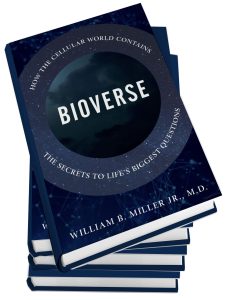 Biology must move beyond genetics, insists William B. Miller, Jr., MD, a physician turned evolutionary biologist. But where, exactly, should biology go? In his new book, Bioverse: How the Cellular World Contains the Secrets to Life’s Biggest Questions, Miller gives his answer: biology must enter “the era of the cell.”
Biology must move beyond genetics, insists William B. Miller, Jr., MD, a physician turned evolutionary biologist. But where, exactly, should biology go? In his new book, Bioverse: How the Cellular World Contains the Secrets to Life’s Biggest Questions, Miller gives his answer: biology must enter “the era of the cell.”
To tease more details out of Miller, GEN’s senior science and technology editor, Anjali Sarkar, PhD, conducted the interview presented here. In this interview, Miller describes “cellular intelligence” and argues that it helps drive evolution. He also suggests an even more provocative idea: it imbues the universe with meaning.
GEN: What’s the “era of the cell”?
Miller: Surprisingly, evolutionary biologists have not welcomed a cellular narrative. Modern synthesis was revived through genetics. Evolutionary biology mostly adheres to a gene-centric view. People like Richard Dawkins have dominated the narrative with genes and gene frequencies, adhering to the concept that biology is random and purposeless.

Many equate life to a computer information network. That’s wrong. The difference is the nature of biological information. Digital information exists in definite orthogonal, square waves. Analog systems show sinusoidal curves that reflect signal ambiguities. Life is noisy. Our cells, like us, are in constant doubt.
Nonetheless, cells learn, remember, solve problems, and communicate. Intelligence is best defined in cellular terms. [Upon receiving and processing] ambiguous information from an imperfect environment, the cell senses itself and its environment.
Cells have purposes. They don’t act randomly. Scientists are starting to understand that cells and intercellular communication hold the answers. This cellular approach will change biology and medicine.
GEN: What’s the origin of cellular intelligence?
Miller: Somehow, cells know their information is ambiguous. They evaluate uncertain environmental clues in collaborative patterns to validate information and [make predictions]. That’s how they sustain what used to be called homeostasis (maintaining an internal equilibrium) and is now better called homeorhesis (maintaining a preferential state of flux). Collaboration favors survival, and so, multicellularity in biofilms and holobionts dominates our planetary narrative. Biology changes dramatically when it recognizes cellular intelligence because when cells can measure and communicate, they can engineer tissues and organisms. Cells produce local ecologies through collaboration—by trading resources freely and [managing] competition.
GEN: How will cellular intelligence shape our future?
Miller: The era of the cell will lead to an array of new products and change our lives. Cellular intelligence will change our mindset. We’ll not bioengineer with cells as robots but concentrate on parameters that matter to cells. Bioengineering then becomes more than just looking for the molecule you can utilize. We’ll investigate when and how cells measure, co-engineer, and communicate, and we’ll learn to leverage natural cellular intelligence to our advantage. It’s a radically different approach. Instead of chemotherapies that kill healthy and cancerous cells, we’re beginning to use immunotherapies. Understanding how cells signal will let us intervene precisely and create sensors, bioactive materials, and synthetic organisms.
GEN: What’s the role of the microbiome?
Miller: None of us could survive without our microbiomes. They’re essential for development, metabolism, and adaptability. Each of our organs has its own microbiome. (Pancreatic cancer can result from a breakdown of the organ’s microbiome.) Every aspect of our physiology is affected by our microbiome, including our moods and behaviors.
Cellular intelligence will teach us how to manipulate microbial relationships through prebiotics and probiotics for our benefit. We’ll find common metabolic connections between our cells and microbiomes to enhance balance and well-being and treat chronic afflictions. We don’t have to age like we do. We’re missing something important. We’re not asking the right questions. Cellular intelligence provides a framework for new questions.
GEN: Could diseases be collaboration breakdowns?
Miller: Specialized cells in multicellular organisms and constituent microbiomes get along seamlessly to permit the organism to function. Cells also maintain collective integrity. Based on their predictions, cells sometimes sacrifice themselves for the collective, such as in apoptosis. Also, some cells specialize to produce goods for the community, trusting that what they’ve stopped producing will be supplied by others. Cells get along by protecting the integrity of other cells. Cancer is the exception. Certain people do get ahead by ignoring the rules.
Human political systems don’t skillfully follow principles of co-dependence and balanced competition. Cells have learned that they serve themselves best by serving others. Intense collaboration was instantiated in cells when life began. Interestingly, the origin of life is known in collectives because single cells can’t fossilize. Cells must be in a communal setting for us to see evidence of their existence. Our first definition of life is collaborative life. The era of the cell will examine how cells accomplish this trick. Human society would be vastly improved if we acted more like our cells.
GEN: How might life reflect quantum principles?
Miller: We can apply quantum principles only loosely to biology. Our senses are reliant on quantum mechanisms. Olfaction needs electron tunneling. The human eye can detect a single photon, which involves quantum superposition. Birds navigate by sensing electromagnetic gradients through quantum mechanisms.
Quantum mechanics is most useful in understanding how ambiguous information impacts cellular and multicellular lives. Superposition of possible quantum states is a neat way of looking at ambiguous information. Every decision an organism or a cell makes is a superposition of choices. By exploring quantum mechanisms, we can gain insights into how cells measure and communicate. Organisms cannot be reduced to quantum equations, but by looking at them as “organized wholes,” you understand that all life is a set of reiterating systems from a single base. That single base is cellular consciousness. We don’t know how it began, but we know it exists through observation and experimentation.
A systems approach gives you a sense of place in the universe. We start from a single competent cell and reiterate into biofilms and small tissue ecologies. Those tissue ecologies become holobionts, which reiterate into societies and cultures. The living system is a system of systems.
From cells to holobionts, we see the principle of nonlocality—where communication occurs across distances that cannot be understood. If I raise my arm, trillions of ATP molecules fire simultaneously that cannot be accounted for by measuring electrical transmission from cell to cell. There’s something else going on. Many scientists believe it’s quantum nonlocality. If that’s true, nonlocality likely reiterates and exists beyond us and this planet. There must be a next level of iteration that connects us with other parts of the cosmos, in ways that remain unclear.


